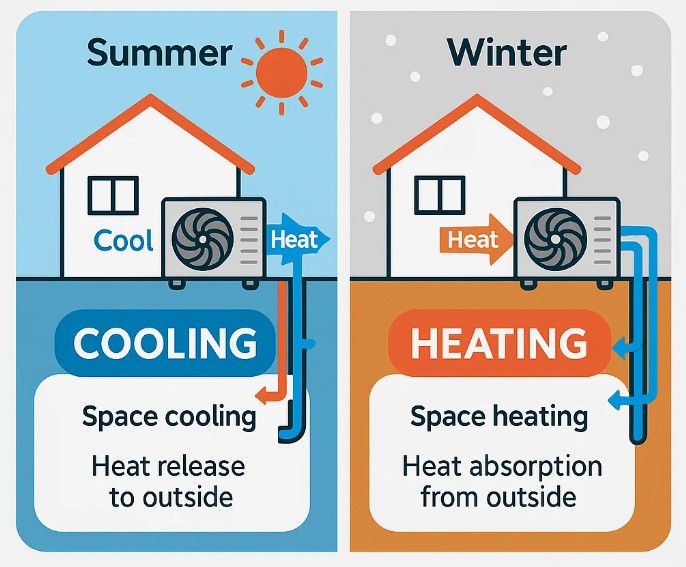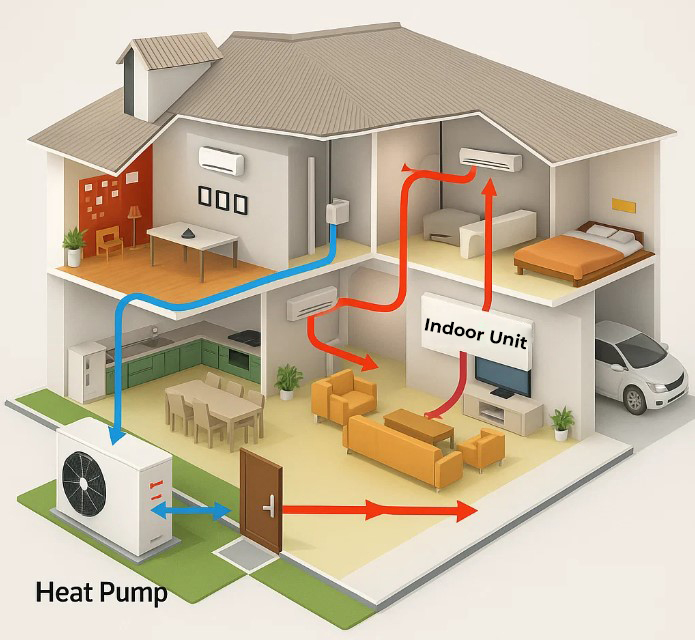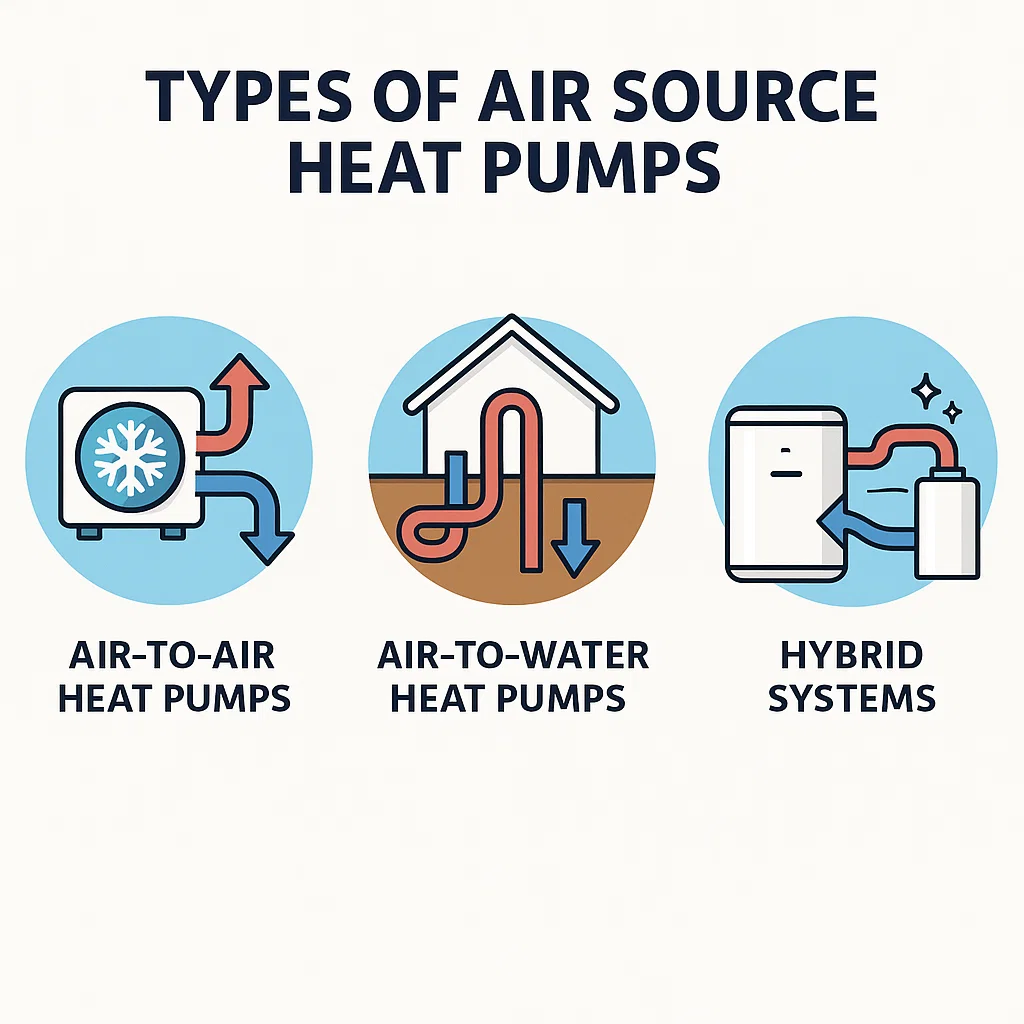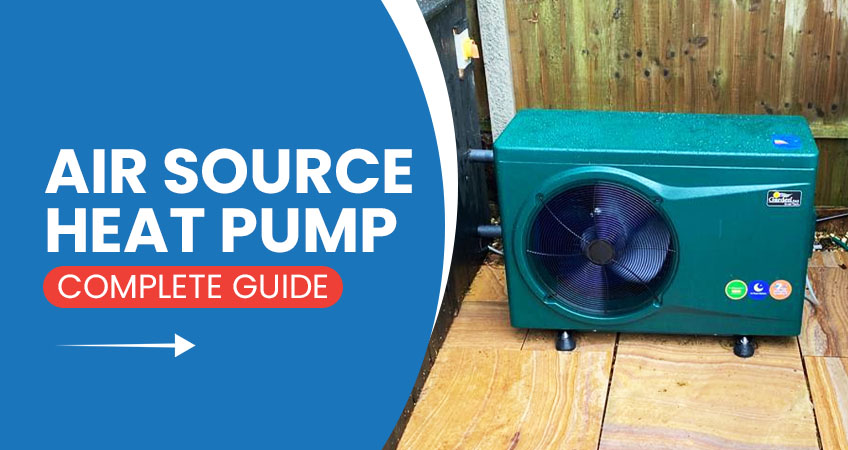If you’re exploring efficient, eco-friendly solutions to heat and cool your home, you’ve probably come across the term “air source heat pump”.
But what exactly is it, and is it the right choice for you? At AW Heat Pump Services, we specialise in helping customers understand and install these innovative systems, saving energy while reducing their environmental impact.
This guide will walk you through everything you need to know about air source heat pumps, from how they work to their benefits, space requirements, and the different types available.
By the end, you’ll have a complete understanding and be ready to decide if an air source heat pump is the right fit for your needs.
How does an air source heat pump work?

At its core, an air source heat pump (ASHP) is a device that transfers heat from the outside air into your home during the colder months, and reverses the process in the summer to provide cooling like an air conditioner.
Even when outside temperatures feel chilly, there’s usable heat in the air. An air source heat pump extracts this heat, amplifies it using an internal heat exchanger, and distributes it indoors.
The components of an air source heat pump system:
- Evaporator – Captures heat energy from the outside air.
- Compressor – Compresses the refrigerant, increasing its temperature.
- Condenser – Transfers the heat to your indoor system (radiators, underfloor heating, etc.).
- Expansion valve – Reduces the pressure of the refrigerant, allowing the cycle to repeat effectively.
The process:
- The evaporator absorbs heat from the air using a refrigerant.
- The compressor increases the temperature of the refrigerant.
- The hot refrigerant passes through the condenser, releasing heat into your home.
- The cooled refrigerant then travels back to the evaporator, restarting the cycle.
This simple yet effective process keeps your home comfortable year-round.
Are air source heat pumps worth it?
If you’re wondering whether air source heat pumps are worth the investment, the answer largely depends on your goals. Here are three compelling reasons why they might be:
Cost savings on energy bills
Air source heat pumps can be highly efficient, producing up to three units of heat for every unit of electricity used. This efficiency can lead to significant savings on energy bills, particularly when compared to traditional heating systems like gas or electric boilers.
Environmental benefits
Reducing reliance on fossil fuels is a key step toward fighting climate change, and air source heat pumps are a fantastic alternative. They use renewable heat from the air, reducing your home’s carbon footprint, especially if paired with a green electricity supplier.
More energy efficient than gas boilers
Traditional heating systems like a gas or oil boiler will often lose energy to inefficiency. High temperature heat pumps run cleaner and smarter, using cutting-edge technology for a more effective and reliable system.
Save money on installation with the Boiler Upgrade Scheme (BUS)
While the upfront heat pump installation cost may seem high, government grants or incentives often help offset the expense, making them a more accessible choice for many households.
The Boiler Upgrade Scheme (BUS) is a government program that offers financial assistance to qualifying households looking to upgrade their heating system to an air source heat pump. This can greatly reduce the initial installation costs and make the switch to an air source heat pump more affordable for homeowners.
They work just as well in cold weather
Contrary to common belief, air source heat pumps can efficiently generate heat even in cold climates. They extract heat from outside air, regardless of the temperature. With proper insulation and system sizing, they perform just as well in winter as in warmer weather.
Unlike traditional heating systems, air source heat pumps operate at lower temperatures, providing consistent warmth even on the coldest days. This makes them a reliable and efficient option for homeowners in harsh winters.
They can improve indoor air quality
Air source heat pumps offer a cleaner alternative to traditional heating systems by using electricity instead of burning fossil fuels, resulting in no emissions. They improve indoor air quality, benefiting those with allergies or respiratory issues, and require less maintenance since they don’t produce byproducts like soot or carbon monoxide.
How much space is needed for an air source heat pump?

One of the questions we’re often asked is how much space you’ll need for an air source heat pump. The answer is, not much! But there are a few things to consider:
Outdoor space:
The external unit, which absorbs heat from the air, needs to be placed somewhere with adequate airflow. Ideally, this should be:
- Outside your home, mounted on a wall or on the ground.
- Clear of obstructions like shrubs, fences, or outdoor furniture.
Indoor space:
Inside, you’ll need room for a heat pump unit and potentially a water cylinder if you’re using the system for hot water. This setup is generally compact and can fit in utility rooms or storage cupboards.
Pro tip: Ensure your installer evaluates your property to optimise placement for efficiency and minimal noise impact.
Different types of air source heat pumps

Not all air source heat pumps are the same. Depending on your needs, there are three main types to consider:
Air-to-air heat pumps:
- Heat the air inside your home and distribute it via ducts.
- Ideal for homes that don’t have a wet central heating system or hot water cylinder.
- Can provide cooling in the summer.
Air-to-water heat pumps:
- Transfer heat to water that circulates through your central heating system.
- Perfect for use as underfloor heating heat pumps or to heat radiators.
- A popular choice for homes that require hot water as well as heating.
Hybrid systems:
- Combine an air source heat pump with a traditional boiler.
- Automatically switches to the more efficient energy source, depending on the conditions.
- Great for homes in colder climates or those looking to gradually transition to renewables.
What about ground source heat pumps?
Ground source heat pumps (GSHPs) use the stable temperatures found underground to provide heating, cooling, and hot water for homes. They work by circulating a mixture of water and antifreeze through a looped system of pipes buried in the ground. Heat is extracted from the ground and transferred to your home’s heating system.
While both ground source and air source heat pumps are energy-efficient, environmentally friendly alternatives to fossil fuel-based systems, they differ in their methods of heat extraction and setup. Ground source heat pumps rely on the consistent underground temperatures, making them less affected by seasonal variations, whereas air source heat pumps depend on the air temperature, which can fluctuate throughout the year.
GSHPs tend to be more efficient over time but require significant excavation and higher upfront costs for installation compared to air source systems. On the other hand, air source heat pumps are easier and cheaper to install, making them a more accessible option for many homes. Both systems provide excellent long-term solutions for reducing energy bills and lowering carbon emissions.
Which type of air source heat pump is best?
Each heat pump type excels in different scenarios. Here are some recommendations based on property size and climate:
For small homes
Air-to-air heat pumps are often the most cost-effective since they require less space for installation and don’t need a water heating system.
For large buildings
Air-to-water systems are ideal for larger properties with higher heat demands. They are compatible with underfloor heating systems, ensuring even heat distribution.
For specific climates
Hybrid systems shine in colder regions where temperatures drop below freezing for extended periods. By switching to a boiler when necessary, they maintain efficiency even in less-than-ideal conditions.
Take the next step with AW Heat Pump Services
Air source heat pumps are more than just a modern heating solution; they’re an investment in energy efficiency, sustainability, and long-term savings.
Whether you’re interested in cutting energy bills, reducing your environmental impact, or simply upgrading your heating system, an ASHP is worth considering.
At AW Heat Pump Services, our team of professionals is ready to help you choose, install, and maintain the perfect air source heat pump for your property.
Get in touch today, and take the first step toward a greener, more energy-efficient future!

